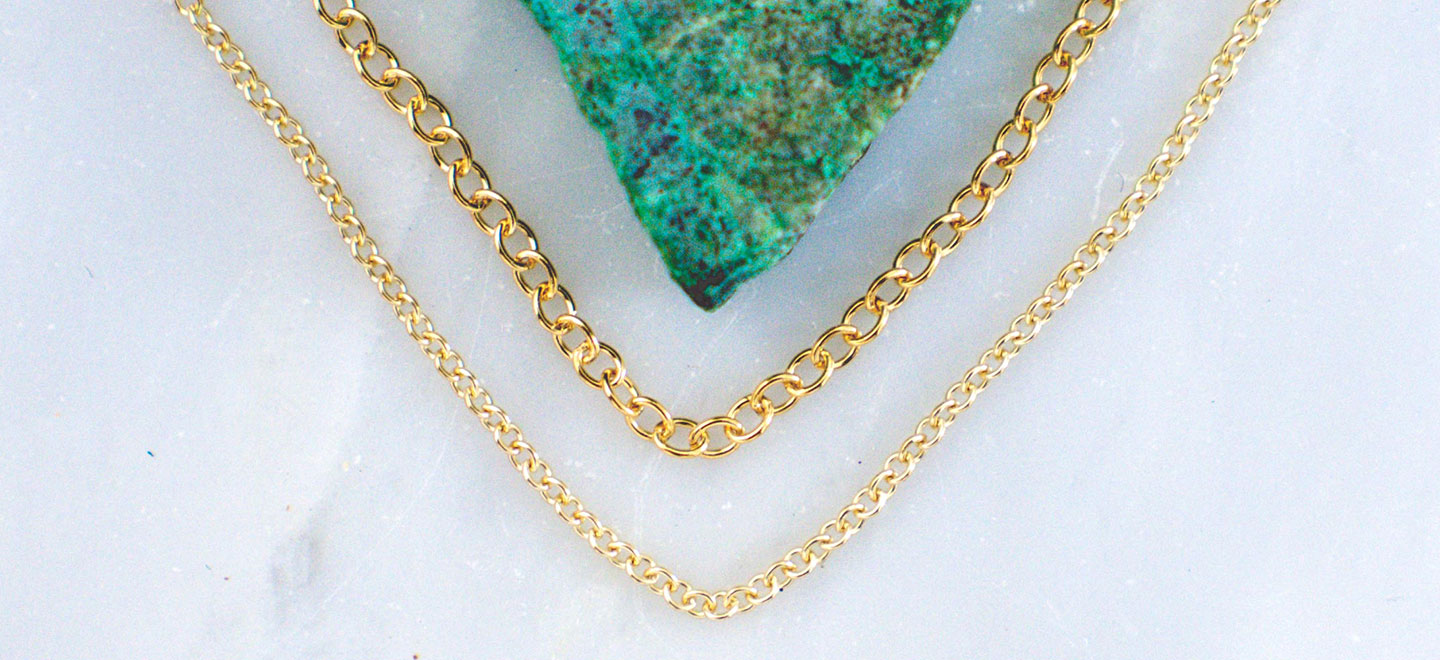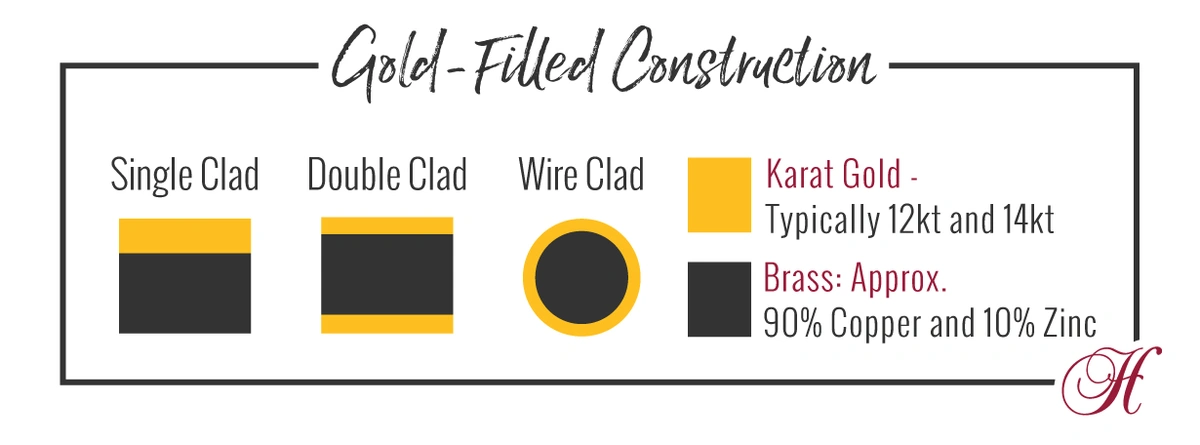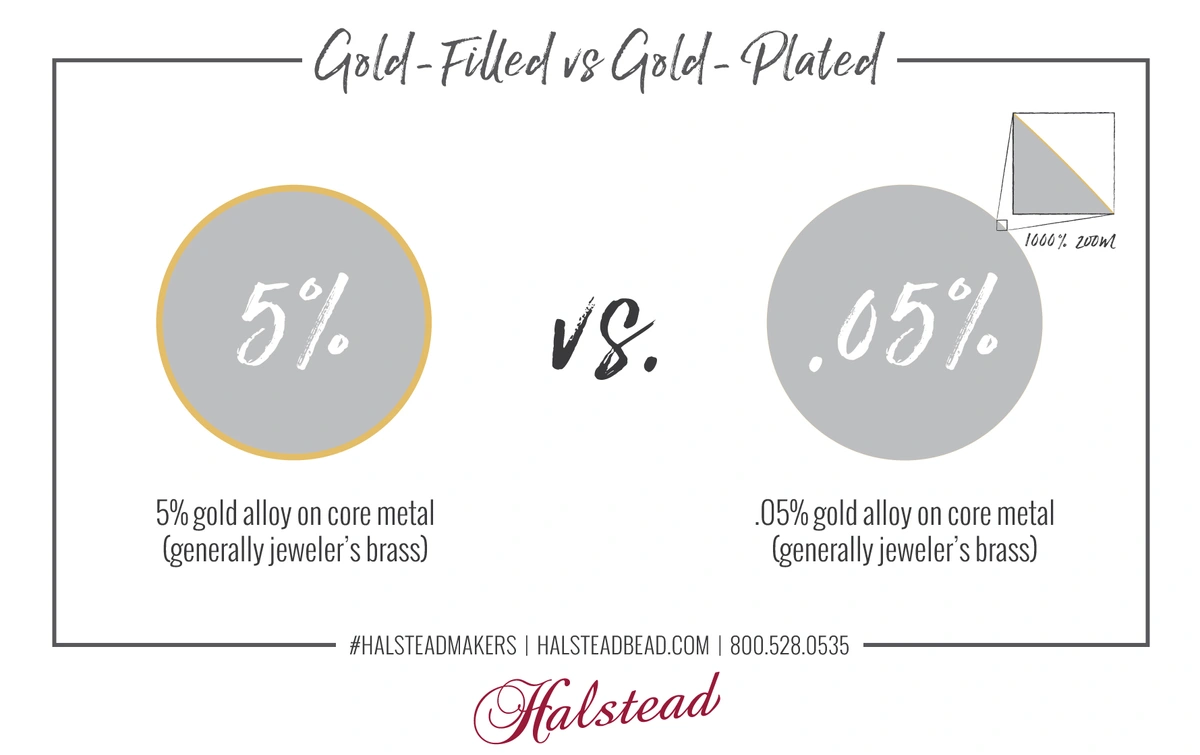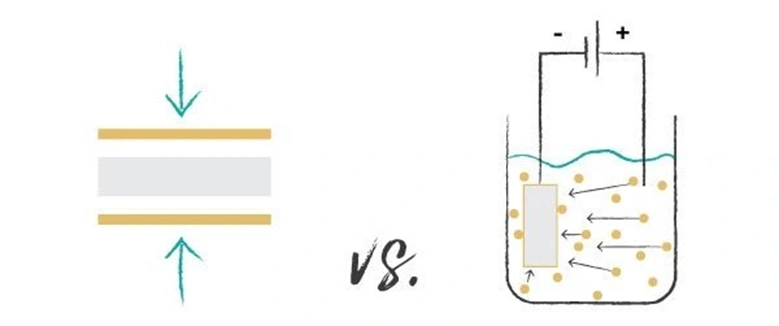Learn the ins and outs of using gold-filled in your designs. Using and explaining gold-filled can be complicated, prepare yourself with these common questions about the material.
Gold-filled is ideal for assembly and light metalwork such as forming and texturing. It responds to manipulation much like brass. It is considerably more durable and easier to maintain than gold-plated material. It is considered a higher quality "bridge" or "demi-fine" material compared to "costume" accessories made from plated base metals. However, it is typically not considered "fine jewelry" or in the same category as solid gold alloys and platinum metals. A lot of new designers have misconceptions about gold-filled material. If you are selling this metal, it is important to understand the product so you can accurately describe it to customers and handle it properly. Here are common questions we hear from customers. But, first a little bit of information about the material.
What Is Gold-filled?
Gold-filled is an affordable, durable alternative to solid karat gold. It is not an alloy. It is a layered material constructed in two or three layers. The core metal is brass; though, in the past, sterling silver was sometimes used instead. Single clad gold-filled has all the gold content in a single layer on one side. Double clad material splits the gold content into surface layers on both sides of the material. The gold alloy is bonded to one or both surfaces of the brass core with heat and pressure. The bonded raw material is sold as a sheet or wire to manufacturers for use in finished products.
Gold-filled products are legally required to be 5% or 1/20 gold by weight. This 5% is described by the karatage of the gold alloy on the surface. Most material is 12kt or 14kt gold-filled. It is most accurately labeled with the karatage, the "/" symbol, and then 20 to reflect this construction. Products are identified as 14/20 or 12/20 Gold-Filled; alternatively, 14kt or 12kt Gold-Filled are also acceptable as long as you use the entire phrase. Quality stamps are abbreviated to 14/20 GF or 12/20 GF. GOLD FILLED CHAIN >>
Gold-filled material made in Italy incorporates a tiny amount of cobalt into the brass layer of the metal. The addition of cobalt improves material hardness and durability. Since it is a magnetic element, gold-filled made in Italy will respond to a magnet test.

Common Questions
1. Why can't you stock more of your cast products in gold-filled?
This layered metal cannot be cast, which is a major limitation in the types of products that can be manufactured in the metal. Products are made from sheet, tube or wire that retain the separate layers of brass and gold. Casting by definition is melting the metal material which would alloy the layers into one big melted mess. GOLD FILLED CHARMS >>
2. Why don't you stock a gold-filled solder?
First, there is no such thing as a gold-filled solder. Your best bet is to color match the solder joint to the surface metal by using 14kt gold color match plumb solder. Second, we do not recommend soldering gold-filled without specific equipment and specialized training.
Usually, gold-filled soldering at the manufacturing level is done with laser welders that make precision joins. If you attempt to solder it with a torch and normal gold or brazing solder you can alloy the surface layer of gold with the brass beneath it. Overheated joins will leave a dark solder stain that is markedly different than the neighboring gold. Any exposed brass will quickly tarnish to black to be even more distinct. Then, the only way to repair it is to plate the entire item in gold to cover the join and match color all over the piece. Similarly, do not sand or file gold-filled since you will remove the gold portion of the product and decrease the surface layer integrity. LEARN MORE ABOUT SOLDERING GOLD-FILLED >>
3. I need the gold item XYZ...
OK, this one isn't a question but it raises an important issue. Some designers will refer to gold-filled items as just "gold." It is not gold. It is illegal to call gold-filled items gold or to abbreviate the description to just 12kt or 14kt. This implies they are a solid alloy with higher pure gold content. Gold-filled is a unique material that must be clearly distinguished from solid gold by professionals in the industry. "Gold" is not an acceptable shorthand and it can get you in legal trouble for fraud. Don't get into this bad habit. It is most correct to describe the material as either 12k gold-filled or 14k gold-filled in all product descriptions. The Federal Trade Commission (FTC) establishes these disclosure regulations for jewelry retail.
4. Is gold-filled the same as gold plated?
No, gold plating is a minuscule layer of solid gold applied to a brass base. The plating does not compose any measurable proportion of the product's total weight. It is estimated to be 0.05% or less of the metal product. Gold plating can wear off quickly and expose the brass base product. It does not stand up to heat, water or wear over time. By comparison, gold-filled contains 5% gold alloy by weight. All the gold is on the surface which offers product protection from tarnish and wear.
Additionally, gold-filled and gold-plated products are made differently. To make gold-filled pieces, the core metal is sandwiched between two layers of gold alloy which is then heated and passed through a roller several times – a process that both bonds the metals together and thins the sheet out. To make gold-plated pieces, an electric current is used to negatively charge the base metal and positively charge a solution containing gold ions. The positive gold ions are attracted to the negative charge of the core metal, slowly forming a thin layer of gold on top of the core.
Gold-filled items are sometimes gold-plated in finishing to protect solder seams and give items an evenly colored surface. You can learn more about plating by reading our blog Jewelry Plating: How and Why it's Used. Not sure how to tell if your favorite gold-filled Halstead products have a plated finish? It's easy! On the Halstead website scroll down to the 'Specs' section on the product detail page. Look for the 'Finish' disclosure. Items that are gold-filled and plated will have a 'Gold-Plated' finish. Items that are raw gold-filled material with no plating will say 'Bright' finish.
When it comes to durability, gold-filled pieces are generally more durable than gold-plated due to the thicker layer of gold alloy. The longevity of either type is dependent on the wear, environment, and quality of the piece. The thickness of the gold alloy layer also affects the piece’s chance of tarnishing. Due to the thin layer of gold that can easily wear off, gold-plated pieces tarnish quickly once the metal core is exposed. Gold-filled pieces can still tarnish, but it is more unusual.
5. Can gold-filled tarnish?
Yes, it can, but it takes a rare set of circumstances. Gold-filled pieces are a lifetime products for normal wear because the gold layer bonded to the brass core is quite thick. However, in instances of extreme sulfide exposure, it can blacken. Once discoloration occurs, it spreads between the gold and brass layers and cannot be removed. This has only occurred a handful of times over our decades of experience:
- Foreign transit through extremely polluted shipping docks has caused the product to blacken on several occasions.
- Products stored in nail salons with high levels of chemical sulfide fumes are at risk of blackening.
- A fire where the structure filled with smoke caused blackening.
- Use in permanent jewelry. We do not recommend gold-filled for permanent jewelry. Layered metals are not a good choice for extreme wear and chemical exposure that can occur when an item is on your body 24/7 for months or years. Choose solid alloys such as 14k gold or sterling silver instead. If discoloration or tarnish occurs, these materials can be cleaned and maintained.
These are extreme conditions. However, it has made me think twice about breathing the air in nail salons. With normal wear, gold-filled usually just requires light surface cleaning with an untreated cloth or mild soapy water.
6. Can you be allergic to gold-filled?
Individuals who have skin reactions with gold alloys will also react to the gold alloy layer on the surface of gold-filled. Some people's body chemistry will cause their skin to blacken or develop a rash when they wear certain metals. I am one of those people and on certain days, my fingers will turn black all around my 14kt wedding band. Read our article Why Jewelry Turns Your Skin Green for more information on this topic.
7. Why is there a color variance between gold-filled items?
The gold-filled color will vary due to the different finishing processes used by manufacturers. Most items are near the industry standard "Hamilton" color; however, some items will be more yellow, tawny, or darker in hue. Variance has increased because more manufacturers are now working with the material and consumer preferences are changing. Hamilton color was standard for many years but different markets now demand more yellow or brassy looking gold finishes. Some manufacturers will add a plating layer on top of the fused, layered gold-filled material to achieve a high-polish finish of a different color. In recent years, gold-filled has become very popular in Asian countries. Consumers there prefer a more yellow gold that mimics high karat alloys. As manufacturers shift production to serve a more global market, we see a wider color range in products.
8. Is gold-filled waterproof?
Social media influencers who do not know the jewelry industry have widely spread the notion that gold-filled is “waterproof.” This is not a product claim that small businesses should make. The term “waterproof” is a regulated product claim with a high legal bar of substantiation. Products must have specifically approved coatings or treatments to prevent water from reaching the material. “Waterproof” products must also have laboratory testing and documentation to substantiate the use of this term. We do not advertise any materials at Halstead as “waterproof.” You shouldn’t either. Not all items that can get wet can be called “waterproof.” Be careful to use trusted information sources when educating yourself about jewelry products and materials. Many online influencers do not have any real education or experience in the industry and can lead you astray. Gold-filled can get wet, as most metals can. However, the larger issue is the soluble chemicals that may be in the water. Occasional exposure to swimming pools, sea water, and the shower are fine. But, you should avoid dishwater, spa treatments, or hot springs that contain higher concentrations of chemicals and minerals.
Overall, gold-filled is a reasonably priced, quality alternative to solid gold. Most gold-filled products are made in the USA or Italy. We offer a wide selection of products in this high-quality metal to outfit your studio with plenty of materials for jewelry design.
Gold-Filled 101 Video Overview
Watch our Gold-filled 101 video for detailed information including material construction, gold layer alloy details, and more. The video has different content than the text above so be sure to check it out! Find this and other great videos on our Halstead YouTube channel.
Cited References:
I—FEDERAL TRADE COMMISSION SUBCHAPTER B—GUIDES AND TRADE PRACTICE RULES PART 24—GUIDES FOR SELECT LEATHER AND IMITATION LEATHER PRODUCTS § 24.3 Misuse of the terms “waterproof,” “dustproof,” “warpproof,” “scuffproof,” “scratchproof,” “scuff resistant,” and “scratch resistant.”
National Archives And Records Administration. Code of Federal Regulations: Trade Practice Rules Respecting The Terms "Waterproof," "Shockproof," "Nonmagnetic," And Related Designations, As Applied To Watches, Watchcases, And Watch Movements, 16 C.F.R. 1960. Periodical. Retrieved from the Library of Congress, <www.loc.gov/item/cfr1960009-T16CIP170/>.
Infinitalab.com: Waterproofness Testing, < https://infinitalab.com/product-testing-service/waterproofness-testing/>.
Bestselling Gold-Filled Products
Halstead is proud to offer quality jewelry supplies, exceptional customer service, and resources for the jewelry field. Check out our Google review rating to see why clients love working with Halstead!
Q&A
Q: Very interesting, and I appreciate it, but I'm confused. I see many pieces on Etsy that have been fabricated by soldering gold-filled wire. I've been considered doing it, and now I'm discouraged. How do those metalsmiths do it? - Selma
A: Very carefully! It is best to use a laser welder and/or solder filled wire to avoid creating a dark scorched joint as described in the blog. Look for specific instructions on soldering gold-filled to avoid burning off the gold layer. Standard soldering techniques with a torch should not be used. Otherwise, the end product may look okay for a little while but exposed brass will blacken more quickly than the surrounding gold.
Q: Thank you for the article, when working with GF pieces and they get scratched what is the best way to repair them? - Pisa
A: You cannot sand gold-filled or use other abrasives without removing gold content. Scratches can be buffed if they are shallow enough but otherwise, the scratches cannot be removed. Your only other choice is to plate them.
Q: I have a piece of wire and I cannot determine if it is gold-filled or brass. I go to extremes of labeling and bagging to separate the two types but this piece got away. How can I tell the difference? - Fiona
A: Try using flush cutters or a jewelers saw to make a clean, fresh cut and then look at the cross-section under magnification. You should be able to see the gold layer on the surface if the material is gold-filled.
Q: Is it okay to engrave on gold-filled pieces? - Redd
A: No, engraving will penetrate the gold layer and expose brass underneath. The exposed brass will quickly blacken.
Q: A lot of the gold-filled chain that I've bought over the past year has darkened. I was shocked. As long as it's sealed in plastic and not worn, it's fine... but as soon as it's left out on display or worn, it goes dark. It looks like an ugly brass. What is going on? 🙁 Can I clean this? I am really disappointed in gold-filled now and want to focus more on sterling until I can figure it out. - Dana
A: This sort of darkening is highly unusual so it sounds like you may have a sulfur contaminant issue.
Q: Hi, I am in the same situation, all the gold-filled that I bought in the past year has tarnished, but the one that I bought 2 years ago from another supplier is in perfect condition. Can these be clean at all? The supplier recommended to clean with regular metal cleaner, but no luck. Any suggestions on how to clean? - Mariangel
A: Unfortunately, once GF blackens you cannot clean the black because the tarnish is occurring in the brass layer that is under the gold layer.
Q: Can you explain why gold-filled cannot be resoldered or repaired? It doesn't rework like gold or silver. Most jewelers won't repair a gold-filled piece. Thank you! - Bronwyn
A: Since gold filled is a layered product soldering will melt the gold and brass at the point where heat is applied. This can either burn off the surface gold or alloy it into the brass core. Either way, you end up with exposed brass on the surface of the piece that will quickly blacken and contrast with the surrounding gold. Once brass from the gold-filled is exposed, the only solution is to plate over the entire piece to recover the brass and even out coloration. Depending on the construction of the design and the presence of stones or beads, the plating may not be possible. Moreover, plating is rarely done in house at jewelry stores so this is a service they would have to outsource at great expense. Login and read our article Soldering Gold-Filled for more information.
Q: Hi, how can you get scratches out of a gold fill pendant? A home remedy would be perfect but if not what are other ways to do so? - Ja
A: There's not much you can do since sanding removes the gold layer. Hopefully, the scratches are light and not easily noticeable.
Q: Can you tell me if a gold-filled item can be engraved? Thank you! - Michelle
A: No, I don't recommend it. If you engrave too deep you'll hit the brass layer which will tarnish over time.
Q: Hi, I'm searching for a partner to cover my 925 silver jewelry (which were made already) with a gold-filled layer. Can you please advise? Big thanks!! - Lydia
A: Hi Lydia. You cannot add a gold-filled layer. Gold-filled is a complete composite material, not a plating. Please see our other blogs on the material definition and specifications. You can, however, add gold plating over sterling silver. Any plating provider can help you with this service. They will want to know the gold color and thickness from you as well as the gram weight of the pieces you are plating. Red Sky Plating in New Mexico will do small lots but there are many other providers on East & West coasts of the USA who can do comparable work. Best of luck!
Q: Are thin gauge gold-filled chain easily tarnished? Thanks. - Linda
A: Great question! It's difficult to tarnish gold-filled pieces whether it is a thin or a thick gauge since the top layer is always gold.
Q: Hi. I have a question regarding its tarnishing. You said that under rare circumstances does it tarnish. How come the necklace that I got from you guys tarnished the blacken so quickly (in 2 months). - Sally
A: Hi Sally, Thanks for your inquiry. I can't possibly answer that question without knowing where the item was stored, where it was shipped to, what chemicals were in close proximity to the item if any, etc. Normally gold-filled items are hard to tarnish but it will happen under extreme circumstances.
Q: How much percentage is in a 24k gold filled ring? - Mikael
A: Hi Mikael,
Here is the gold karat break down:
24kt = 100%
22kt = 91.6%
18kt = 75%
14kt = 58.5%
10kt = 41.7%
6kt = 25%
Your ring would be a pure gold ring at 24kt. Let us know if you have any other questions.
Q: how long would a 24k gold filled ring will last? how many years give or take? - Mikael
A: Since it's a solid gold ring it would be extremely soft, therefore it would all depend on how often it is worn.
Q: Are there any sealants that can be used for the cut ends of a gold-filled wire piece to keep it from turning black? - Jada
A: Hi Jada, that’s a great question. Beeswax or Renaissance Wax will slow down the tarnishing process but they will not prevent it permanently. However, it should only be noticeable on pretty thick pieces of wire. 20ga and smaller are usually fine. I hope that helps!
Q: Will a nameplate necklace tarnish which is 12k gold filled with a gold plate metal if wear every day - Nicole
A: Gold-filled should stand up very well, however, conditions do exist where it will tarnish. Chemical sulfides and heavy toxins in the air will tarnish it, so just be careful where you wear it and it should be fine.
Q: Hi! If I cut a gold-filled nameplate (say 30 x 7mm rectangular) from a 20 gauge gold-filled sheet, will the cut ends with an exposed brass tarnish or turn people's skin green?
A: You can slow down the tarnishing with Renaissance or Beeswax, and it should be fine for a while. As for the ends turning people's skin green, the cut ends of a nameplate shouldn't be close to their skin, so I think you will be fine there. I hope that helps!
Q: I was wondering about this article's assertion about the rarity of tarnishing of gold-filled materials. My understanding is that any grade of gold with a lower karat rating than 24kt (=100% gold) is alloyed with some amount of copper which is definitely tarnishable. It stands to reason, then, that gold-filled material that uses 14kt or 12kt would tarnish over time. The question is, how readily?
FYI, I've had bad experiences with gold-filled chains purchased on Etsy, which tarnished very fast (after 1 week of use). In all fairness, I should note that the chain was Rolo chain and it's possible that the link was single-clad, so maybe the non-gold side of the chain was what tarnished so quickly. Also, I did not wash or wipe the chain regularly. It's also possible that the chains I purchased were possibly low quality or fake gold-filled chains, though. There seem to be many fake gold-filled chains being sold on Etsy and eBay, so much so that I'm considering just sticking with Rio Grande where I buy most of my jewelry supplies anyway. Anyhow, could you please give me an idea of how long a chain (cable chain, let's say) from your site will stay shiny if it's washed and cleaned with soapy water and soft cloth? Would you be willing to guarantee it? - EM
A: It sounds as if you received a fake gold-filled chain on Etsy. A true gold-filled chain should last for years as long as it is taken care of. It's impossible to give you an idea of how long a chain would last or a guarantee because we simply don't know what conditions it would be in and how it would be cared for. You should buy all your gold-filled chains from a reputable source though since there are many fakes being sold out there.
Q: Hello, very interesting watch, thank you. So if you can't solder gold-filled, how do you securely close jump rings, etc? thank you, Andrea
A: Hi Andrea, we recommend using a professional who has hands-on experience with gold-filled do the soldering for you. A laser welder is also a good option but will require training and practice.
Q: I just started to use gold-filled and I have no experience. For some reason, after polishing my ring it turned into silver. Any idea why? - Justyna
A: Hi, Justyna. We will need more information before answering your question. I suspect it may be the polishing compound that you used reacting badly to the brass. Can you send us a detailed explanation of all that you used when you attempted to polish the ring? Thanks!
Q: I brought a necklace from the store and I want to know how to determine if it is real or not. - Lisa
A: Hi, Lisa. Gold-filled pieces should be marked, but if it's not you should take it to a professional jeweler to have it tested.
Q: I bought a 14k gold filled mariner chain and in between the chain links I can see the base metal. Is the chain just gold plated? It is stamped14kB, gold bonded. Idk if it was gold filled but they had to file it in those areas to make the chain. Or if it was just dunked in gold plating? - Tim
A: Hi Tim. I would suggest contacting the vendor you purchased the chain from. They would be able to tell you the process used on that specific one.
Q: How long should gold-filled keep its gold appearance? will it eventually wear off? I wonder about things such as toggle closure, where there will rubbing. TY! - Lori
A: Gold-filled can last for years as long as it is cared for. The gold layer is thick so gentle rubbing shouldn't wear it out even by the closures. If it does need to be cleaned, use a soft toothbrush and soap to gently clean it.
Q: Hi does gold filled have a smell to them after a while? - Alvina
A: Hi Alvina, I've never heard of that happening before. Try using mild soapy water with a child's soft toothbrush to gently clean it.
Q: Pertaining to gold filled does the 5% requirement only pertain to GF made in the US? What about other countries like China, can they put less and still call it GF? - Julie
A: In the United States, we are regulated by the FTC which states that GF jewelry must contain 5% gold alloy by weight, therefore, it is illegal to claim that a piece is GF if it does not meet that percentage and use heat and pressure bonding. The gold layer should be 12 karat or higher and the karatage must be disclosed. In China, they are regulated by AQSIQ which is not as strict to the percentage of gold found in gold-filled. If you were to purchase gold-filled from another country, you should get a certificate from the manufacturer to prove the gold content in the piece. Also, If you wanted to turn around and sell it here, legally you can not call it gold-filled if it doesn't meet the FTC requirements. You should always buy all your gold-filled components from a reputable source to be safe.
Q: Will stamping a gold-filled blank expose the brass underneath the gold layer? I am worried that stamping will start to tarnish. - Lynn
A: Hi Lynn, It shouldn't. The gold layer is thick enough that it compresses with the indentation, rather than exposing the metal as cutting it would.
Q: Dear Erica, thank you for so much information. Greatly appreciated. I am also allergic to different metals and must wear at least 14kt gold. I am a beginner and purchased gold-filled wire to practice making items as gifts. What would be an appropriate gauge for stringing beads of 8mm & 10mm? Thank you. - Gail
A: That's a personal choice. The weight of the beads, hole size, the overall shape of the finished piece...etc can play roles in it. I have never strung beads on gold-filled wire because it is such a hard, expensive material. It is perfect for wire wrapping and weaving, though. Have you thought of stringing wire instead? These types of wire produce a nice, draped look.
Q: Hello Hilary! I am planning on metal stamping gold-filled blanks. Do you think it is legal/ethical to stamp gold-filled and then market it as gold-filled? In essence, does stamping the gold-filled blank cause it to lose enough gold that it would no longer be considered gold-filled? Thank You, Whitney
A: Hi Whitney, that's a great question! When you stamp gold-filled it compresses it instead of removing the gold-filled. You're not losing the gold in the process like you would if you were sanding it away. Hope that helps!
Q:Hi..reading ftc.gov and other sites like yours has good info.. BUT when it comes to gold filled i read it should have a stamp. i.e. 14kt...or 14ktGF...or no stamp of 14kt is required by LAW!
so is there a federal LAW that it must be stamped if its gold filled only???? or is it just a good thing to look for and the USA manufacture didn't stamp or mark it because it isn't a law? i known higher content gold (pure, with less fillers) must have a stamp in USA...but the conflicting info on gold filled is driving us nuts! ftc.gov didn't have much on stamping gold filled. many gold filled items we have bought or want to buy DON'T have any stamps or markings and so far no problems. can you help us? and is it a Federal LAW and what website does it say GOLD FILLED MUST BE STAMPED / MARKED IF MADE IN USA. thank you, Ryan
A: Hi Ryan, the answer to your question is no, not all gold-filled items are stamped. Small parts are exempt from stamping, because of their space restrictions. This is normal for findings, regardless of their material. We suggest purchasing gold-filled findings from trusted vendors, only.










